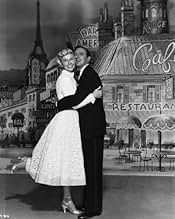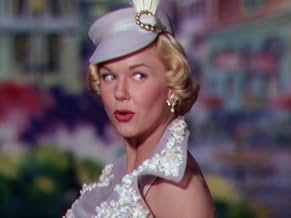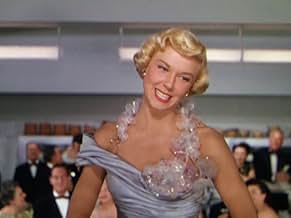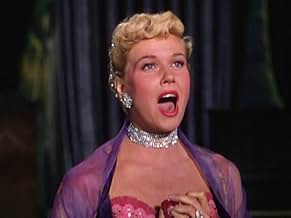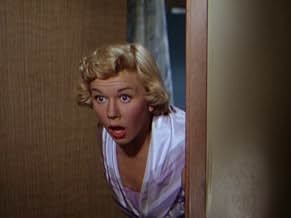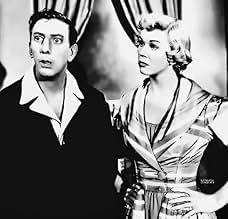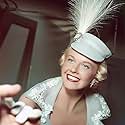NOTE IMDb
5,9/10
1,6 k
MA NOTE
Ajouter une intrigue dans votre langueA series of misunderstandings leads to a chorus girl traveling to Paris to represent the American theater, where she falls in love with a befuddled bureaucrat.A series of misunderstandings leads to a chorus girl traveling to Paris to represent the American theater, where she falls in love with a befuddled bureaucrat.A series of misunderstandings leads to a chorus girl traveling to Paris to represent the American theater, where she falls in love with a befuddled bureaucrat.
- Réalisation
- Scénario
- Casting principal
Aladdin
- Violinist - 'Rock the Boat Tonight' number
- (non crédité)
Leon Alton
- Stagehand
- (non crédité)
Betty Arlen
- Young Woman
- (non crédité)
Frank Baker
- Delegate
- (non crédité)
Doris Barton
- Chorus Girl
- (non crédité)
Mary Bayless
- Ship Passenger
- (non crédité)
Mary Benoit
- Secretary
- (non crédité)
Avis à la une
Doris Day is fun in this movie. Her smile lights up the screen, her rendition of the title song is not corny- it is terrific. Her dancing is vivacious and guaranteed to brighten up your day.
Bolger's dancing is a bit vaudevillian but has a happy uniqueness that is very watchable. Many of his moves are like a series of "controlled falls" that require tremendous balance- this is harder than it looks. On the other hand some of his dance is very above-average tap or two-step. Overall he seems to combine a lot into his different routines. As a bonus, his acting is not bad and better than you might expect.
This film suffers from cheapness and a nothing plot, but is overcome by exceptional talent and charm by all the cast. Who cares if it is cheap and set-bound? The results are entertaining and that's the true bottom line.
Bolger's dancing is a bit vaudevillian but has a happy uniqueness that is very watchable. Many of his moves are like a series of "controlled falls" that require tremendous balance- this is harder than it looks. On the other hand some of his dance is very above-average tap or two-step. Overall he seems to combine a lot into his different routines. As a bonus, his acting is not bad and better than you might expect.
This film suffers from cheapness and a nothing plot, but is overcome by exceptional talent and charm by all the cast. Who cares if it is cheap and set-bound? The results are entertaining and that's the true bottom line.
This is a pleasant but basically forgettable musical from a decade that produced far better. The performers are all talented and have done much better elsewhere; they are not to blame. The script is basically boring, and the title very misleading: only the last 15 minutes or so of the movie takes place in Paris. And when it does, it's all painted backdrops. We never really get to Paris.
What I found interesting was the post-WW II notion that Americans are very up-tight, especially sexually, and that a trip to Paris could do wonders to loosen them up. (This idea is well presented in the great 1948 Billy Wilder movie, "A Foreign Affair," though there Paris is not the answer, it's just getting out of the American mindset and encountering Europeans.) One of the bright spots of the movie is Doris Day's dance-and-sing number on the ship, "I'm gonna ring the bell tonight," when she encounters the "joie de vivre" of the French crew on the ocean liner and starts to loosen up herself.
For what it's worth, the setting for this number seems to have been taken from a Jane Powell movie from four years before, *Luxury Liner*. Jane's character does an interesting - but not as interesting - number in the kitchen of the title's luxury liner with the kitchen staff early in the movie.
Later, there is a decent number with Day and the Frenchman, Philippe Fouquet (Claude Dauphin, playing the role that Georges Guétary had played so much better the year before in "An American in Paris") in which the appeal and disappointments of Paris are sketched out.
In sum, this is a pretty forgettable movie: forgettable music, certainly, forgettable dialog mostly (though there are a few nasty lines between Day and her female rival), unremarkable story - you never believe there is any real feeling between Ray Bolger and Day - forgettable if energetic dancing. Coming a year after "An American in Paris" - and no doubt meant to play off the success of that movie - this is pretty much a letdown. Even the scenes of Paris are fake.
What I found interesting was the post-WW II notion that Americans are very up-tight, especially sexually, and that a trip to Paris could do wonders to loosen them up. (This idea is well presented in the great 1948 Billy Wilder movie, "A Foreign Affair," though there Paris is not the answer, it's just getting out of the American mindset and encountering Europeans.) One of the bright spots of the movie is Doris Day's dance-and-sing number on the ship, "I'm gonna ring the bell tonight," when she encounters the "joie de vivre" of the French crew on the ocean liner and starts to loosen up herself.
For what it's worth, the setting for this number seems to have been taken from a Jane Powell movie from four years before, *Luxury Liner*. Jane's character does an interesting - but not as interesting - number in the kitchen of the title's luxury liner with the kitchen staff early in the movie.
Later, there is a decent number with Day and the Frenchman, Philippe Fouquet (Claude Dauphin, playing the role that Georges Guétary had played so much better the year before in "An American in Paris") in which the appeal and disappointments of Paris are sketched out.
In sum, this is a pretty forgettable movie: forgettable music, certainly, forgettable dialog mostly (though there are a few nasty lines between Day and her female rival), unremarkable story - you never believe there is any real feeling between Ray Bolger and Day - forgettable if energetic dancing. Coming a year after "An American in Paris" - and no doubt meant to play off the success of that movie - this is pretty much a letdown. Even the scenes of Paris are fake.
Of all the major Hollywood studios, Warner Brothers were always the most cheese-paring. All of their musicals -- except the wonderful 'Yankee Doodle Dandy' and some later adaptations of Broadway musicals -- are marred by extremely low budgets and obvious economy measures. 'April in Paris' is one of several Warners musicals featuring an established popular ditty (with a stiff price-tag for performance rights) as the movie's title song, buttressed by some very forgettable songs by resident Warners tunesmiths. Except for one high-spirited and high-kicking number called 'Ring the Bell Tonight', only the E.Y. Harburg/Vernon Duke title song is memorable here.
Doris Day amazes me, not only for her unearthly beauty and her quiet sex appeal, and for her underrated acting ability, but also for her musical talents. I've read that Day originally trained as a dancer, but switched to a career as a vocalist after she was injured in a car accident. Her singing voice is so clear and beautiful, I've difficulty believing that singing was her second choice of career. And, as she proves here, she has no physical handicap as a dancer ... unless you count the dull choreography of LeRoy Prinz.
Ray Bolger is an interesting choice of romantic leads for Day, but the two of them don't really team very well. Here, he plays a character very similar to the one played by Donald O'Connor in 'Are You with It?': a repressed wonk who turns out to be a superb dancer. Bolger (an underrated actor) is quite good in his straight scenes here as a harried bureaucrat, a less nelly version of Edward Everett Horton ... but that character just doesn't match up with Bolger's dazzling dance numbers. Bolger's Massachusetts accent is much more obvious here than in any of his other films. Bolger was sometimes required to play epicene men, as in the Broadway musical 'By Jupiter'. Here, he's impressively virile, as he strips off his dinner jacket and lights into some rapid-fire nerve taps far more proficient than Ann Miller's.
I always enjoy watching Bolger dance. Here, regrettably -- blame it on LeRoy Prinz -- Bolger doesn't do anything he hasn't done better in several better musicals, except for a brief trick shot in which he dances between two full-length portraits of Washington and Lincoln (also played by Bolger) who dance along with him. I was impressed with a brief pas de deux between Bolger and Day, in which she dances conventionally but manages to keep up with Bolger while he does his usual "Where's Charley?" moves.
The contrived plot line requires Bolger and Day to mistakenly believe they're married to each other. Two Frenchmen perform the wedding service without actually being qualified for that job. This being a Hollywood film of the 1950s, it's imperative that the fake marriage remain unconsummated, so the two Frenchmen then have conscience pangs and sabotage the marital bed so that no sex can take place ... instead of simply admitting their deception. Speaking of 1950s morals: this movie's dialogue features several occurrences of the word 'gay' in its innocent sense.
Two of my least favourite movie clichés are: every building in Washington DC is directly across the street from the Capitol, and every location in Paris has a clear view of the Eiffel Tower. We get both of those clichés in this movie. On the positive side, we get a brief appearance by character actor Shepard Menken as a Parisian waiter. Actress Eve Miller does her best in an unplayable role as Day's rival. Eve Miller's acting career never quite caught on; she suicided shortly after her fiftieth birthday.
The movie's weird plot gives us Claude Dauphin as an omniscient Frenchman. A gag sequence requires that Ray Bolger's hat be several sizes too large ... but later the same chapeau fits him perfectly, and later still it's too large again when the scriptwriter recycles the gag. This movie is more than competently directed by the underrated David Butler, but matters are not helped by a script which requires Day's and Bolger's characters to be unable to make up their minds about deeply important issues such as love and career. Still, as enjoyable froth, I'll rate 'April in Paris' 7 out of 10.
Doris Day amazes me, not only for her unearthly beauty and her quiet sex appeal, and for her underrated acting ability, but also for her musical talents. I've read that Day originally trained as a dancer, but switched to a career as a vocalist after she was injured in a car accident. Her singing voice is so clear and beautiful, I've difficulty believing that singing was her second choice of career. And, as she proves here, she has no physical handicap as a dancer ... unless you count the dull choreography of LeRoy Prinz.
Ray Bolger is an interesting choice of romantic leads for Day, but the two of them don't really team very well. Here, he plays a character very similar to the one played by Donald O'Connor in 'Are You with It?': a repressed wonk who turns out to be a superb dancer. Bolger (an underrated actor) is quite good in his straight scenes here as a harried bureaucrat, a less nelly version of Edward Everett Horton ... but that character just doesn't match up with Bolger's dazzling dance numbers. Bolger's Massachusetts accent is much more obvious here than in any of his other films. Bolger was sometimes required to play epicene men, as in the Broadway musical 'By Jupiter'. Here, he's impressively virile, as he strips off his dinner jacket and lights into some rapid-fire nerve taps far more proficient than Ann Miller's.
I always enjoy watching Bolger dance. Here, regrettably -- blame it on LeRoy Prinz -- Bolger doesn't do anything he hasn't done better in several better musicals, except for a brief trick shot in which he dances between two full-length portraits of Washington and Lincoln (also played by Bolger) who dance along with him. I was impressed with a brief pas de deux between Bolger and Day, in which she dances conventionally but manages to keep up with Bolger while he does his usual "Where's Charley?" moves.
The contrived plot line requires Bolger and Day to mistakenly believe they're married to each other. Two Frenchmen perform the wedding service without actually being qualified for that job. This being a Hollywood film of the 1950s, it's imperative that the fake marriage remain unconsummated, so the two Frenchmen then have conscience pangs and sabotage the marital bed so that no sex can take place ... instead of simply admitting their deception. Speaking of 1950s morals: this movie's dialogue features several occurrences of the word 'gay' in its innocent sense.
Two of my least favourite movie clichés are: every building in Washington DC is directly across the street from the Capitol, and every location in Paris has a clear view of the Eiffel Tower. We get both of those clichés in this movie. On the positive side, we get a brief appearance by character actor Shepard Menken as a Parisian waiter. Actress Eve Miller does her best in an unplayable role as Day's rival. Eve Miller's acting career never quite caught on; she suicided shortly after her fiftieth birthday.
The movie's weird plot gives us Claude Dauphin as an omniscient Frenchman. A gag sequence requires that Ray Bolger's hat be several sizes too large ... but later the same chapeau fits him perfectly, and later still it's too large again when the scriptwriter recycles the gag. This movie is more than competently directed by the underrated David Butler, but matters are not helped by a script which requires Day's and Bolger's characters to be unable to make up their minds about deeply important issues such as love and career. Still, as enjoyable froth, I'll rate 'April in Paris' 7 out of 10.
A late-night viewing of this period piece shows it to be a charming and amusing glimpse into an earlier time. Doris Day holds up well, brightly singing, dancing, and portraying the all-American girl with gumption. Bolger's dancing is phenomenal, but the chemistry between them is not really there; it's hard to believe they really like each other very much. The costumes are outrageous in a campy way - almost Busby Berkley level synchronized dance scenes. A fashion-show scene shows overdone eccentric outfits in various colors, with French poodles dyed to match. In the last musical scene, Doris starts out with a floor-length gold cape with mini-pleats radiating from her shoulders; and then takes it off to show a bare midriff any current teenager would be proud of. The movie opens with some vintage scenes (current to the time of the film) of Washington DC, complete with streetcars. But the most anachronistic element is the main theme of the plot, which revolves around Bolger and Day coming close to sleeping together, thinking they are legally married, when in fact (horrors!!) they're not. In summary, it's a great combination of lightweight plot, eye candy, good music and a few laugh-out-loud lines, wrapped in the relative innocence of the fifties.
Doris Day as Ethel 'Dynamite' Jackson gets a letter from the State Department saying that she's been chosen to be an American representative at an Arts Festival in Paris. The letter was supposed to go to Ethel Barrymore instead. Doris had written the State Department about a work permit visa to work at a nightclub in Montreal.
It's a faux pas of the highest order that State Department bureaucrat Ray Bolger has committed and he tries to rectify the situation. But when the press gets a hold of it, the thing becomes a popular move. So Bolger's boss Paul Harvey puts him in charge of getting Doris's diplomatic etiquette up to speed. For better or worse Bolger and Day are going to spend April In Paris together.
The popular Vernon Duke-E.Y. Harburg standard serves as the title for this film and Warner Brothers got Vernon Duke to write the balance of the score with Sammy Cahn's lyrics. Nothing really outstanding here, but the score fits well with styles of the two leads.
Doris is great as always, the problem here is Bolger and the part he plays. Ray Bolger was a great personality on stage who but for two roles never quite was able to translate the same popularity to the big screen. One role was of course the Scarecrow in The Wizard Of Oz and the other was the lead in Charley's Aunt. And both of those were comic parts.
As a traditional screen lead Ray never quite made it. In fact in watching April In Paris I couldn't quite see what Doris saw in him. Of course with her attraction it was obvious as Bolger so succinctly put it, 'What a Built'. Ray plays a traditional WASP stuffed shirt diplomat who is engaged to the demanding daughter of Harvey, Eve Miller. Getting involved with Day was not an upward career move.
Of course Doris sparks the attention of Claude Dauphin who's working his way back to France on the same ship that Bolger and Day and company are traveling. She has a nice number with Dauphin in a Parisian nightclub.
Bolger's big moment on the screen is a very nicely staged fantasy number where portraits of Lincoln and Washington come alive and dance with him as Bolger dreams about his future. It was as creative as something Gene Kelly or Fred Astaire might have done.
Still Ray is not quite leading man material and the film can't overcome that. Fans of Doris and Ray will like it though, but I fear it's not one of Doris Day's best films.
It's a faux pas of the highest order that State Department bureaucrat Ray Bolger has committed and he tries to rectify the situation. But when the press gets a hold of it, the thing becomes a popular move. So Bolger's boss Paul Harvey puts him in charge of getting Doris's diplomatic etiquette up to speed. For better or worse Bolger and Day are going to spend April In Paris together.
The popular Vernon Duke-E.Y. Harburg standard serves as the title for this film and Warner Brothers got Vernon Duke to write the balance of the score with Sammy Cahn's lyrics. Nothing really outstanding here, but the score fits well with styles of the two leads.
Doris is great as always, the problem here is Bolger and the part he plays. Ray Bolger was a great personality on stage who but for two roles never quite was able to translate the same popularity to the big screen. One role was of course the Scarecrow in The Wizard Of Oz and the other was the lead in Charley's Aunt. And both of those were comic parts.
As a traditional screen lead Ray never quite made it. In fact in watching April In Paris I couldn't quite see what Doris saw in him. Of course with her attraction it was obvious as Bolger so succinctly put it, 'What a Built'. Ray plays a traditional WASP stuffed shirt diplomat who is engaged to the demanding daughter of Harvey, Eve Miller. Getting involved with Day was not an upward career move.
Of course Doris sparks the attention of Claude Dauphin who's working his way back to France on the same ship that Bolger and Day and company are traveling. She has a nice number with Dauphin in a Parisian nightclub.
Bolger's big moment on the screen is a very nicely staged fantasy number where portraits of Lincoln and Washington come alive and dance with him as Bolger dreams about his future. It was as creative as something Gene Kelly or Fred Astaire might have done.
Still Ray is not quite leading man material and the film can't overcome that. Fans of Doris and Ray will like it though, but I fear it's not one of Doris Day's best films.
Le saviez-vous
- AnecdotesDoris Day wrote in her autobiography that she only encountered trouble or tension on two of her Warner Bros. movies: 'April in Paris' and Un amour pas comme les autres (1954). Regarding this film, she claimed that leading man Ray Bolger and director David Butler clashed early on, with Butler accusing Bolger of trying to steal scenes away from Day. She also mentioned that being a relative newcomer to movies, she was unaware of Bolger's tricks and managed to stay out of the line of fire.
- GaffesRay Bolger supposedly flies to New York when he realizes the invitation mixup, but the plane is shown flying over the Wrigley Building in Chicago.
- Citations
Ethel S. 'Dynamite' Jackson: It's no use, Philippe. I'm in love with the man I married. And he's not even my husband!
Philippe Fouquet: Even in Paris, that's an unusual situation.
- ConnexionsFeatured in IMDb Originals: Doris Day: In Memoriam (2019)
Meilleurs choix
Connectez-vous pour évaluer et suivre la liste de favoris afin de recevoir des recommandations personnalisées
- How long is April in Paris?Alimenté par Alexa
Détails
- Date de sortie
- Pays d’origine
- Langues
- Aussi connu sous le nom de
- París en Abril
- Lieux de tournage
- Société de production
- Voir plus de crédits d'entreprise sur IMDbPro
- Durée1 heure 40 minutes
- Rapport de forme
- 1.37 : 1
Contribuer à cette page
Suggérer une modification ou ajouter du contenu manquant


